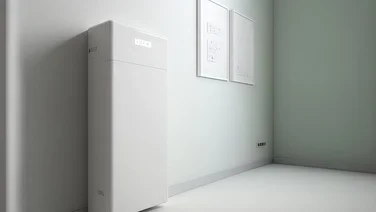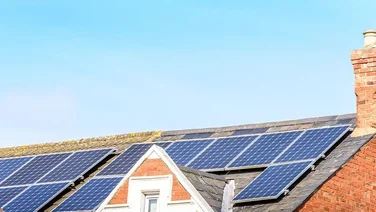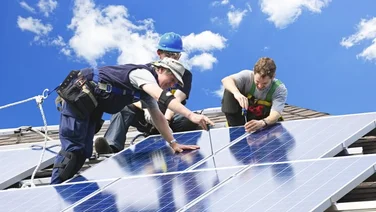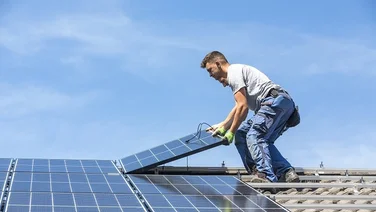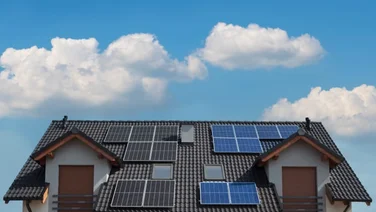We receive a small fee from trusted installers when you request a quote through our site. This helps us keep our content independent, well-researched and up to date – Learn more
- What is a 4 kW solar panel system?
- Do you need a 4 kW solar panel system?
- What’s the average price of a 4 kW solar panel system?
- How much electricity can a 4 kW solar panel system produce?
- Should you get a battery with your 4 kW solar panel system?
- Could you have a 4 kW off-grid solar panel system?
- Next steps
- FAQs
✔ 4 kilowatt solar panel systems cost around £8,030, on average
✔ 4 kW systems are best suited for three-bedroom homes
✔ They generate around 3,023 kWh per year, on average
Despite the high cost of solar panels, over 1.3 million UK households have adopted the technology (MCS installation data, 2023). That means millions of UK residents are gaining the benefits of lower energy bills, reduced carbon emissions, and clean electricity.
One popular solar choice are 4 kilowatt (kW) solar panel systems, which typically suit medium-sized homes, with three or more bedrooms, and cost around £8,030 to install.
Want to learn more about 4 kW solar panel systems? In this article, we’ve discussed everything there is to know about 4 kW solar panel systems, including how many panels you’ll need, how much electricity the system can generate, whether you need a solar battery, and whether you can go off-grid with a 4 kW system.
If you’re ready to get a solar panel system, we can help you compare solar panel prices. Simply enter a few details about your home in the form, and our expert installers will get in touch with obligation-free quotes for you to compare.

What is a 4 kW solar panel system?
A 4 kW solar panel system has a power output of 4 kilowatts (kW), which generates around 3,000 kilowatt-hours (kWh) of electricity per year. That’s about the same as the average electricity consumption of a three-bedroom house.
4 kW solar panel systems work like all other solar panel systems – they use photovoltaic materials to generate energy by converting sunlight into clean electricity. This enables people to power their homes without fully relying on the grid.
You might not be able to go off-grid with a 4 kW system completely, because you won’t be able to power everything you’ll likely need. And, you would only be able to power your home during the day.
But, you’ll still reduce your grid reliance and become more energy independent. Plus, you’ll slash your carbon emissions by as much as 0.8 tonnes each year with a 4 kW solar panel system – or 10% of the annual emissions of a typical UK household.
How many solar panels are in a 4 kW solar panel system?
There are between 11 and 12 solar panels in a 4 kW system, with each panel typically having a power rating of around 350 watts.
You might be able to reduce the number of panels on your roof if you opt for monocrystalline solar panels. They’re one of the most efficient types of solar panels you can get, but they are more expensive than polycrystalline.
This is because they’re more efficient, meaning they can generate more power per panel and thus use less space on your roof overall.
It’s also possible to have a 4 kW system using thin-film solar panels. Although, you’ll use more space to achieve 4 kW, as thin-film panels are less efficient than regular panels, meaning they produce less electricity.
If you want a more detailed answer on how many solar panels you’ll need, follow the link for our in depth guide.

Do you need a 4 kW solar panel system?
You’ll want a 4 kW solar panel system if your home consumes around 3,000 kWh of electricity per year.
Not sure how much electricity your property consumes? It’s quite simple to work out how much power you use on a monthly basis – either look at your energy bill, or take a look at your smart meter if you have one.
A typical three-bedroom home consumes around 2,700 kWh, which is the average across the UK – so a 4 kW system will be ideal in this situation. You might want to consider a larger system (such as a 5 kW solar panel system) if you live in a four-bedroom property or larger, as your electricity consumption will likely exceed 3,500 kWh.
How big is your solar panel system, and how roughly much did it cost?
“We have a 5.76 kilowatt (kW) system, comprising of 16 360 watt (W) fully black Canadian solar panels. They’re connected to a Solis 5G 5.0 kW dual tracker inverter, with direct current (DC) isolation […].“We paid just under £5,000 for the whole system, and £750 for an electric car charging port.”
Do your solar panels generate enough power to cover all your electricity needs?
“I would say that they cover half of our electricity needs, or up to two thirds. Obviously when there is more sun, we are better off.“We have a smart meter, and I see it set to zero a lot of the time.”
Are you receiving money via the Smart Export Guarantee?
“We are with Octopus Energy, and I think we get 9p per kilowatt hour. We signed up for the Smart Export Guarantee when we signed up with Octopus.”
Melissa lives in the East Midlands, and has owned solar panels since July 2022.
What’s the average price of a 4 kW solar panel system?
You’ll pay an average of £8,030 for a 4 kW solar panel system, which is roughly £703 per panel.
That includes installation, but of course, solar panel costs may vary, depending on who installs your solar panel system and the type of panels you go for.
As for the break-even point on a 4 kW system, the average is is 15.66 years, and you’ll make £159 per year by selling excess energy back to the grid via the Smart Export Guarantee (SEG).
How much electricity can a 4 kW solar panel system produce?
A 4 kW solar panel system will generate around 3,000 kWh per year, or around 8.2 kWh per day.
However, the amount of electricity your system generates each day will depend on the weather – with bright, sunny days being the optimal conditions.
But you don’t have to worry too much about solar panels not working when the clouds block the sun, because they’re effective even then. Your panels’ efficiency will drop by around 23% in light cloud cover, down to 66% under heavy clouds, meaning solar panels will still work on cloudy days in the UK.
Although they’ll continue working even in poor weather conditions, you might need to fall back on some electricity from the grid to meet your needs.
Should you get a battery with your 4 kW solar panel system?
It’s worth considering a solar battery for your 4 kW solar panel system if you aim to store electricity to use at night.
A battery will further reduce your grid reliance and help you save a further £132 every year on your electricity bill.
You will also use around 80% of your total solar power (according to our calculations), on average, instead of having it go to waste. To compare, users only use roughly 50–60% of solar power without a battery.
Solar batteries are expensive though, and buying one will increase the break-even point of your solar system to around 24 years. The increase is down to the fact you’ll need a minimum of two solar batteries within the typical 25-year lifespan of your solar panels.
If you still want to press ahead, check out our guide to the best solar batteries.
Could you have a 4 kW off-grid solar panel system?
A 4 kW solar panel system won’t be able to power a complete off-grid setup, but adding a solar battery could make it easier.
Simply put, a system this size won’t let you go fully off-grid because there’ll be times when the sun isn’t bright enough to provide enough energy for this setup.
You’d likely need to supplement an off-grid setup with another source of renewable energy, such as a small wind turbine – which’d add anywhere between £2,000 and £7,000 to your total costs.
If you add a storage battery to your 4 kW solar panel system, it’ll cost you around £17,030 – that includes the system itself, plus the two batteries you’ll need throughout the lifespan of the solar panels (25 years or more).
Next steps
A 4 kW solar panel system is great for a three-bedroom property with an average electricity consumption of 3,000 kWh per year.
It’ll shrink your energy bills, reduce your carbon emissions, and because you’ll be generating your own clean energy, you can limit your reliance on the grid. That’s a result for your finances and the environment.
Ready to start comparing solar panel prices? We can help — just enter a few details about your home in the form and we’ll connect you with our expert suppliers. They’ll get in touch with obligation-free solar panel quotes for you to compare.
FAQs
Will a 4 kW solar panel system run a house?
A 4 kW solar panel system will provide enough electricity for the majority of three-bedroom homes, and some four-bedroom homes. As the typical three-bedroom home consumes around 2,900 kWh a year, the 3,000 kWh generated by a 4 kW system annually will cover daily needs.
How many batteries do I need for a 4 kW system?
You’ll want a battery with a capacity of 8–9 kW if you have a 4 kW solar panel system. That’s because a 4 kW system will generate roughly 8.2 kilowatt hours (kWh) of electricity a day – enough to charge your battery for use at night.
Is a 4 kW solar system worth it in the UK?
If you can afford the upfront cost, or get a solar panel grant, a 4 kW system is definitely worth it in the UK.
This is true regardless of where you live – even if you have solar panels in Scotland, where you still can generate enough electricity to significantly reduce energy bills.
On average, solar panels will slash annual energy costs by £614. This includes profits made from selling excess electricity to the grid via the Smart Export Guarantee (SEG).


